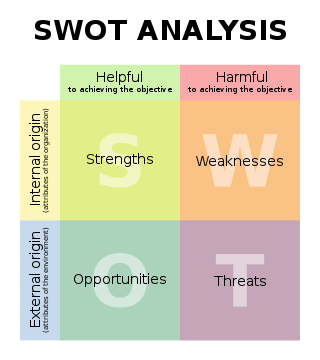Planning is the “act of formulating a program for a definite course of action” [1] Before undertaking any sort of project or task, a plan must be developed. “Preparation of a comprehensive plan will not guarantee success, but lack of a sound plan will, almost certainly, ensures failure.” [2] The plan should be a “realistic view of the expectations” [3]. It is the key to growth, helping too forecast the future to some extent and bridge the gap between where we stand and where we intend to go. There are numerous critical elements that a plan must contain in order to be effective. The plan should be set by a person having authority and define a clear and realistic goal. It should be easily measurable in qualitative and quantitative terms in order to provide a benchmark upon which actual performance can be measured and assessed. Additionally, the plan should outline specific strategies to implement throughout the project so that there is a clear definition of action towards achieving short and long term goals. However, a plan is never perfect. It cannot exactly predict the future but when done correctly, it can provide the best possible direction in successfully completing the project or goal.
One of the most effective tools in strategic planning is the SWOT analysis. “It involves specifying the objective of the business venture or project and identifying the internal and external factors that are favorable and unfavorable to achieving that objective” [4]
 By taking a comprehensive review of both the internal and external environment of a business or any collaborative work, understanding where we stand and factors that can be beneficial or detrimental to achieving the project or goal are clearly defined. There are a multitude of types of planning such as the business plan, statutory planning and strategic planning but all contain the same concepts or critical elements as aforementioned. The process of planning is primary to the success of any project being undertaken. Beginning a project without a clear and comprehensive plan will ultimately waste time and resources. The effectiveness of ones methods are weakened without the guidance of a plan. In short, “He who fails to plan, plans to fail.” [5]
By taking a comprehensive review of both the internal and external environment of a business or any collaborative work, understanding where we stand and factors that can be beneficial or detrimental to achieving the project or goal are clearly defined. There are a multitude of types of planning such as the business plan, statutory planning and strategic planning but all contain the same concepts or critical elements as aforementioned. The process of planning is primary to the success of any project being undertaken. Beginning a project without a clear and comprehensive plan will ultimately waste time and resources. The effectiveness of ones methods are weakened without the guidance of a plan. In short, “He who fails to plan, plans to fail.” [5] References
1. http://wordnet.princeton.edu/perl/webwn?s=planning Accessed: May 26, 2008.
2. http://en.wikipedia.org/wiki/Planning#Planning_basics Accessed: May 26, 2008.
3. http://en.wikipedia.org/wiki/Planning#Planning_basics Accessed: May 26, 2008.
4. http://en.wikipedia.org/wiki/SWOT_analysis Accessed: May 26, 2008.
5. http://thinkexist.com/quotation/he_who_fails_to_plan-plans_to/169985.html Accessed: May 26, 2008.
Image - http://upload.wikimedia.org/wikipedia/commons/thumb/0/0b/SWOT_en.svg/320px-SWOT_en.svg.png Accessed: May 26, 2008.
Haughey, D 2008, Project Planning A Step by Step Guide, Accessed: May 26, 2008. <http://www.projectsmart.co.uk/project-planning-step-by-step.html>

No comments:
Post a Comment